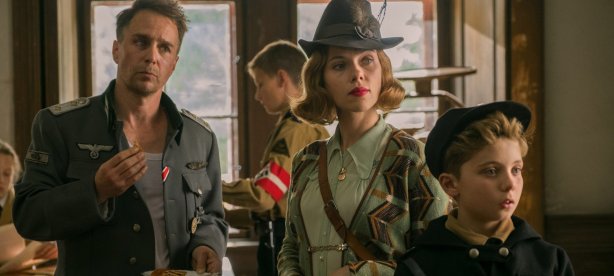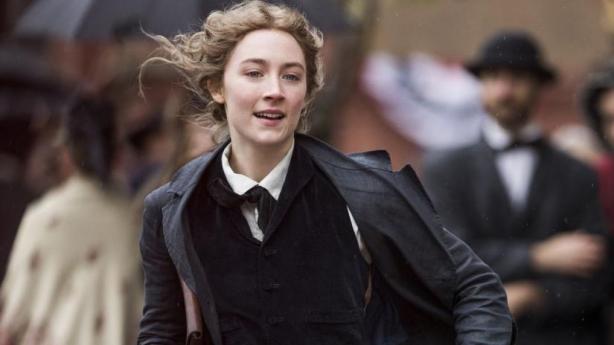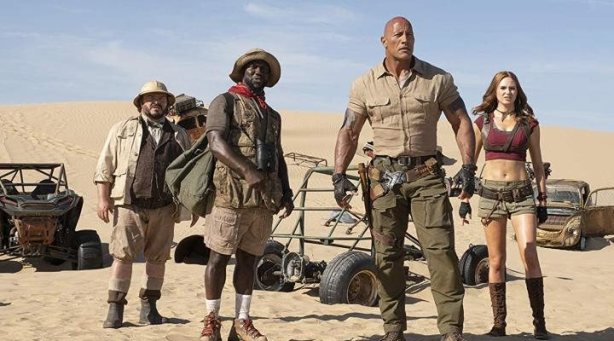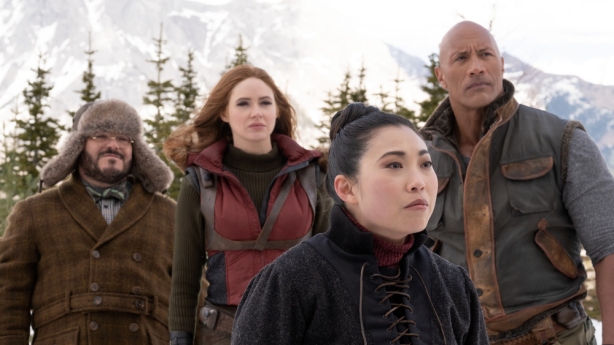Directed by Taika Waititi. Starring Roman Griffin Davis, Thomasin McKenzie, Taika Waititi, Sam Rockwell and Scarlett Johansson.

In the latter stages of World War 2, Jojo (Griffin Davis) is a ten-year-old boy living in Nazi Germany. Indoctrinated by propaganda, and egged on by his imaginary friend, a childish version of Hitler (Waititi), he firmly believes that Jews are monsters and the Nazi party is completely in the right.
When he refuses to kill a rabbit at Hitler Youth camp he earns the nickname Jojo Rabbit, and while trying to reclaim some dignity he’s wounded by a grenade and as such he’s forced to spend more time at home which leads him to uncover a young Jewish girl (McKenzie) hiding upstairs, and to notice that his mother (Johansson), who is opposed to the war, is leaving notes all over town.
Soon Jojo finds himself having to confront the fact that everything he’s been taught is a lie.

Taika Waititi’s follow up to the insanely enjoyable Thor: Ragnarök is a very different film, at once more intimate and political, yet also displaying the distinctive flourish of a very accomplished director. It’s funny and heart-breaking, and I enjoyed it a lot, and yet…I can’t help feeling it’s perhaps not as good as many people, including the Academy where it’s up for best picture, think it is.
The thing is that satire is difficult to pull off, a tightrope walk, especially when you’re dealing with such an emotive real life subject as Nazism. Marrying horror and humour is never easy, and whilst Jojo Rabbit contains both, for the most part they’re kept separate, meaning the film’s tone dips and rises as it swings between comedy and tragedy and I wish there’d been more instances where we got both together. Compare this with a film like Armando Iannucci’s The Death of Stalin which manages to horrify and amuse simultaneously. There are moments, but Jojo Rabbit never quite manages that level of satirical consistency.
The cast are superb, in particular young Roman Griffin Davis is marvellous (where’s his Oscar nom, eh?). As the central focus of the film he’s in practically every scene yet never seems overawed, either by the subject matter or company of more experienced actors, and in particular he has wonderful chemistry with both McKenzie and Johansson. His journey from fanatic to realisation isn’t sugar coated, and nor is it quick or easy making it all the more believable.

Johansson gives a nuanced, and somewhat unexpected performance. Rosie isn’t the woman you expect her to be, by turns joyous and quirky, she’s tortured, and her heartbreak at what’s happening to her country, and her son, are clear in every look Johannsson gives, and she’s far from the perfect movie mom, at times she’s downright mean to Jojo, if only for his own good, but is never less than loving.
McKenzie is also good, similarly she isn’t a shrinking violet, despite being in hiding. Elsa is a girl who has nothing left to lose except her life, and isn’t above threatening a small boy. McKenzie does her best with the material she’s given, even if at times she feels more like a plot device to educate Jojo rather than a character in her own right.
I could watch Sam Rockwell read the phone book, so of course he’s great, even if his noble German officer is something of a cliché, but he’s not alone there. When Stephen Merchant turns up as a Gestapo agent he seems to be channelling multiple comedy Nazi’s we’ve seen before, from Allo Allo’s Herr Flick to Ronald Lacey in Raiders, but thankfully it’s a cameo appearance so doesn’t detract too much.
Rebel Wilson as brutish Hitler Youth trainer is funny, but perhaps a little too broad at times.

This leaves the director himself as Hitler, or rather the imaginary Fuhrer friend Jojo has conjured for himself. He’s childish, impulsive and of course in no way like the actual Adolf. It’s a trick that could have easily fallen on its face, and maybe for the odd moment it does, but for the most part it makes for some of the funniest moments of the film, especially as he keeps offering Jojo cigarettes. I can see how people took against this, but it’s important to remember that it’s a small boy’s fantasy of Hitler, and Waititi I very funny. I wonder as well if this helped to get such a wonderful performance out of Griffin Davis.
His direction is very assured, in particular the opening titles where we get footage of Hitler arriving to give a speech overlaid with the soundtrack of the Beatles in concert is exceptional, and the film looks gorgeous, with the town looking almost idyllic, until you see the bodies hanging in the town square.
The script is very funny, and obviously a film highlighting the ease with which fanatical political ideas can grab hold, even of supposedly civilised people, is especially relevant in the current climate, but the plot is a little pedestrian, and aside from one heart-breaking rug pull in the middle of the film it rarely goes anywhere truly unexpected, and though mentioned, for the most part the Holocaust is out of sight and out of mind.
Well-acted and directed, funny and heart-breaking there’s a lot to love about Jojo Rabbit, and I feel slightly guilty for not liking it more than I did, I just can’t shake the feeling that it could have been something truly special if Waititi had been just a little more daring. That moment aside it feels like it plays things a little too safe.
Still lots to enjoy and well worth seeing!










 Moore is great here, and yes he is starting to look a bit older but at least he’s portrayed as slightly less sleazy than he has been elsewhere. His relationship with Melina takes time to grow, and while he hops into bed with the countess he is technically “on the job” and Harris is at least only young enough to be his daughter rather than his granddaughter! And then there’s Bibi, who Bond fends off.
Moore is great here, and yes he is starting to look a bit older but at least he’s portrayed as slightly less sleazy than he has been elsewhere. His relationship with Melina takes time to grow, and while he hops into bed with the countess he is technically “on the job” and Harris is at least only young enough to be his daughter rather than his granddaughter! And then there’s Bibi, who Bond fends off.







 By Ian Rankin.
By Ian Rankin.